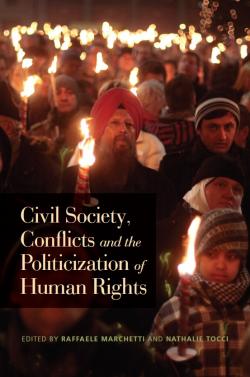Civil Society, Conflicts and the Politicization of Human Rights

Civil Society, Conflicts and the Politicization of Human Rights explores violent conflict and peace. The contributors examine how violence is generated, managed, exploited and eradicated in ethno-political conflicts, and how societies can be dragged out of conflict onto the transition towards peace. The usual take on these phenomena focuses on the role of governmental actors, both national and international. While official actors remain important, Civil Society, Conflicts and the Politicization of Human Rights examines the other side of the coin: the non-governmental component in ethno-political conflicts. Civil society actors, or as they are defined in this book, "conflict society organizations" (CoSOs), are increasingly central in view of the high degree of complexity of contemporary ethno-political conflicts. CoSOs have become key players in ethno-political conflicts, both as violators and as promoters of human rights. Nevertheless, the precise relationships underpinning the human rights-civil society-conflict nexus have not been fully examined. This volume analyses the impact of civil society on ethno-political conflicts through their human rights-related activities, and identifies the means to strengthen the complementarity between civil society and international governmental actors in promoting peace. These aims are addressed by examining four case studies in the European neighbourhood: Bosnia-Herzegovina, Cyprus, Turkey’s Kurdish question and Israel-Palestine.
-
Dati bibliografici
Tokyo, United Nations University Press, 2011, xvi, 259 p. -
ISBN/ISSN/DOI:
978-92-808-1199-5
Figures and tables
Contributors
Abbreviations
Foreword, Johan Galtung
1. Introduction: Civil society, ethnic conflicts and the politicization of human rights, Raffaele Marchetti and Nathalie Tocci
Part I. Theoretical framework
2. Human rights and the (de)securitization of conflict, Thorsten Bonacker, Thomas Diez, Thorsten Gromes, Jana Groth and Emily Pia
3. Conflict society and human rights: An analytical framework, Raffaele Marchetti and Nathalie Tocci
Part II. Case studies
4. Human rights, civil society and conflict in Israel/Palestine, Laure Fourest
5. Human rights, civil society and conflict in Cyprus, Olga Demetriou and Ayla Gürel
6. Human rights, civil society and conflict in Bosnia-Herzegovina, Giulio Marcon and Sergio Andreis
7. Human rights, civil society and conflict in Turkey’s Kurdish question, Nathalie Tocci and Alper Kaliber
Part III. Comparative analysis
8. Gender, conflict society and human rights, Diana Levantesi Copper
9. Redefining European Union engagement with conflict society, Raffaele Marchetti and Nathalie Tocci
10. Human rights discourses and conflict: Moving towards desecuritization, Emily Pia and Thomas Diez
11. The impact of civil society on conflict: A qualitative comparative analysis, Thorsten Bonacker, Christian Braun and Jana Groth
12. Epilogue: Civil society, human rights and conflicts. Does knowledge matter?, Angela Liberatore
Index



